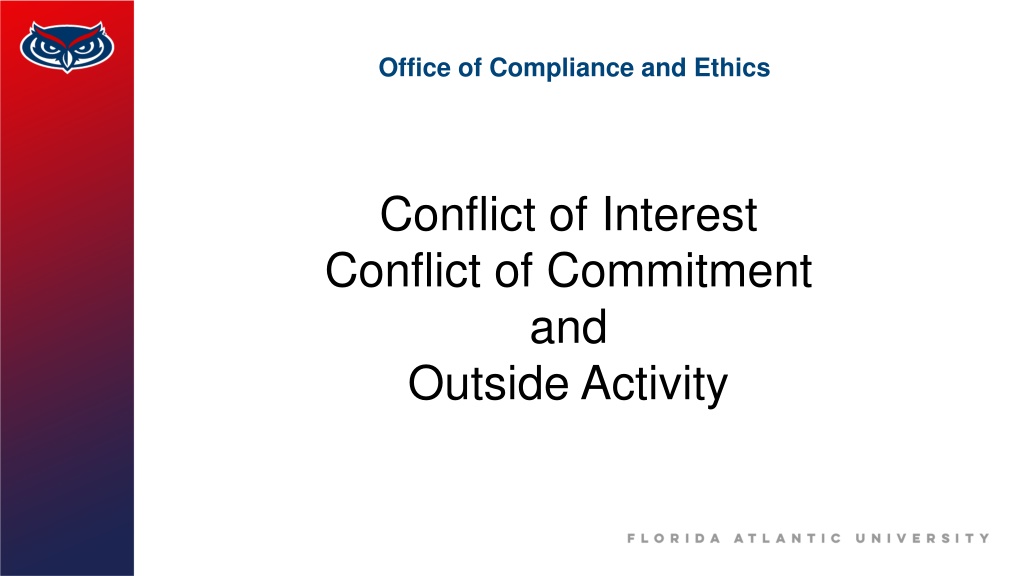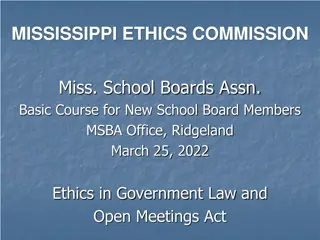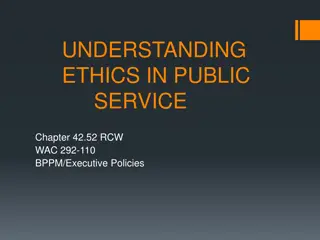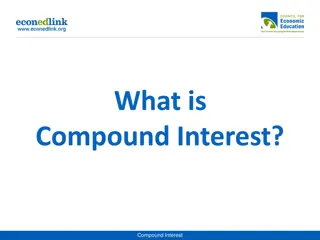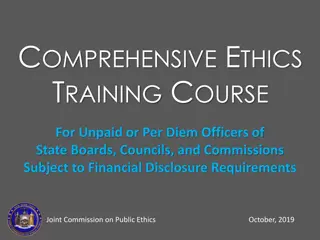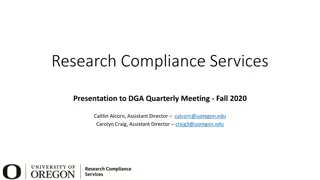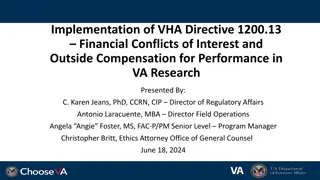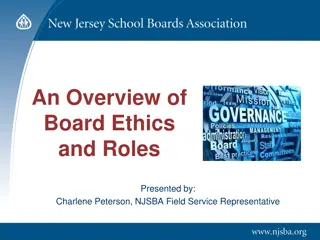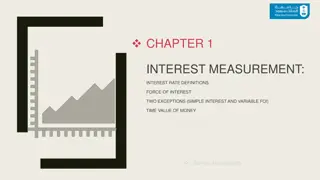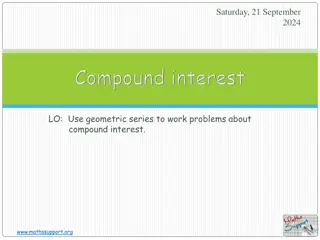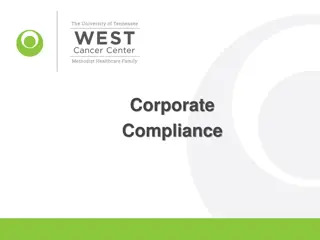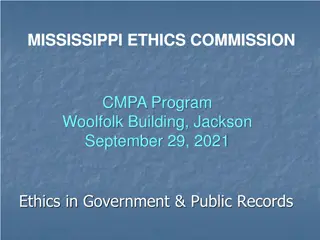Understanding Conflict of Interest, Conflict of Commitment, and Outside Activity in Compliance and Ethics
Exploring the concepts of conflict of interest, conflict of commitment, and outside activity in the context of compliance and ethics in a professional setting. This includes definitions, examples, prohibited conflicts, and considerations for maintaining ethical standards in both personal and professional activities.
Download Presentation

Please find below an Image/Link to download the presentation.
The content on the website is provided AS IS for your information and personal use only. It may not be sold, licensed, or shared on other websites without obtaining consent from the author. Download presentation by click this link. If you encounter any issues during the download, it is possible that the publisher has removed the file from their server.
E N D
Presentation Transcript
Office of Compliance and Ethics Conflict of Interest Conflict of Commitment and Outside Activity
Outside Activity Includes consulting, employment, teaching, research, speaking engagements, or business matters, as well as managerial interests or positions or service on boards or commissions May be compensated or uncompensated Not a part of the employee s assigned duties (including service), not representing the University, and the University provides no compensation Generally, does not include participation in political, religious, social, fraternal, recreational or personal educational activities, unless: the activity requires the provision of professional services, the activity involves compensation other than the reimbursement of expenses, the activity otherwise creates a material conflict of interest or commitment.
Conflict of Interest & Conflict of Commitment Conflict of Interest: Focuses on a financial, economic, professional or personal gain, interest or advantage of any kind from the person s position with the University in a manner that may (or may appear to): inappropriately influence the person s professional judgment, compromise the person s abilities to carry out institutional responsibilities, adversely affect the educational programs and professional careers of individual students and faculty members, or misuse or re-allocate University personnel and resources for private gain. Conflict of Commitment: Focuses on the distribution of effort between a University appointment, obligation, or commitment versus the effort devoted to external professionally-related or personal activities. Assesses the burden on, or interference with, the employee s primary obligations and commitments to the University. Individualized determination considering the employee s specific work responsibilities and obligations to FAU, including, but not limited to: Job description/offer letter regarding expectations and duties Performance appraisals Benchmarks for assessment Expectations outside of regular business hours
Prohibited Conflicts (Florida Code of Ethics) Renting or selling any goods, services or property to the University (including certain relatives) Having an outside employment or a contractual relationship with any business entity which is doing business with the University, compensated or uncompensated; Soliciting or accepting anything of value, including gifts, loans, rewards, promise of future employment, favor or service if the employee knows or should have known that it was given to influence their professional judgment or official action; Using or attempting to use your official position or any property or resource that is within your trust to obtain special privilege, benefit, or exemption for yourself or others; and Claiming to represent the University or using University letterhead or the University seal, logos, or other marks in connection with any outside employment or activity, unless authorized in writing. Certain transactions and business relationship may be exempted or waived
University Policy (8.3) Employees may engage in outside activities to further the dissemination and use of the knowledge and expertise; and/or advance the professional competence and reputation of the employee Regulations and laws that must be considered in the area of conflicts of interest and conflicts of commitment, include without limitation: Florida Code of Ethics and other statutory provisions; University regulations and policies; Collective bargaining agreements (UFF CBA Article 19); and Rules of National Collegiate Athletic Association (NCAA) Conflicts depend on the situation in which an individual is placed, rather than the character or actions of the individual some (but not all) conflicts may be permitted with a Management Plan Employees must disclose outside activities and certain financial interests for supervisory review and approval (i.e., conflict clearance).
Reporting Requirements All FAU employees possessing at least a .5 appointment at the University, other than student employees, OPS employees and graduate teaching assistants, and any University employee engaged in the design, conduct, or reporting of research regardless of FTE, full-time, or part-time status are required to complete an outside activity report in a form directed by the University on or before Sept 30 of each year (or the commencement of employment with FAU if this occurs after Sept 30). If an employee has no information to disclose, a report must still be completed. Includes outside activity occurring during times during which the employee is on leave or has no active appointment (inclusive of summer or other off periods for 9- month appointments). If a change in the information occurs prior to the next reporting date, a new disclosure report must be submitted for approval prior to commencement of a new activity Disclosures may be made for anticipated activities of a similar nature that have smaller lead time Part-time, student, or OPS employees, including adjuncts and GTAs, as well as volunteers, emeritus faculty, and affiliates are generally but not required to report unless: they are engaged in the design, conduct or reporting or research, or they are asked to complete a disclosure by their supervisor for conflict review Separate disclosures are required for sponsored projects (different FCOI criteria)
Reportable Activity & Interests Management, employment, or consulting activities, including without limitation: entities which do business or compete with the University, including competition for grants Candidacy for public office or service on a professional board Outside activities that involve more than an incidental use of university facilities, equipment or services or university student(s) or employee(s) under your supervision Outside activities involving: (i) any research funded, directly or indirectly, by a domestic or foreign institution or entity, (ii) a research collaboration with scientists or researchers, or (iii) use of the University s intellectual property Professional compensated activities, including, but not limited to teaching at another domestic or foreign institution or retention as an expert witness Financial interests (including financial or managerial interests of your spouse & children) if there is a relationship with the University, its DSOs or your assignment UFF-FAU CBA Appendix J has examples of reportable and nonreportable activities Nonreportable examples: Volunteering or community service unrelated to your area of expertise, personal hobbies, serving as an external reviewer, reviewing proposals, or participating in conferences while representing FAU
Review Procedures Responsibility for disclosure rests with the individual employee Review and oversight responsibility rests primarily with the chair, director, or supervisor, and the applicable dean or vice president A conference is encouraged between the faculty or staff member and his or her chair or other immediate supervisor if there are any questions or concerns A COI Review Committee has been established as a resource for conflict questions If the activity or interest commences without disclosure and approval, and a conflict of interest or conflict of commitment is later determined, the employee may be asked to cease or modify the activity or divest itself of the financial interest Review may be required by the Chief Compliance & Ethics Officer for integrity concerns regarding outside activity by certain employees involved in research Section 1012.977, F.S. requires suspension without pay for failure to disclose
Considerations & Takeaways Outside activities or financial interests which are prohibited by state law, including without limitation the Florida Code of Ethics, cannot be allowed. Limited statutory exceptions (e.g., sole source, sponsored research, etc.) May not be mitigated with a management plan Outside activities involving students or employees under your supervision are discouraged Non-incidental use of university equipment, facilities or services must be approved prior to the activity & available to others Employee engaging in outside activities must recognize that they are performing such activities as an individual and not on behalf of the University Whether an activity or interest involves a conflict is dependent on the specific facts, which underscores the importance of disclosure and discussion of possible conflicts. Recommended that full-time faculty engage in no more than eight (8) hours per week on outside activities Visit the Reporting Outside Activity FAQs page for further guidance Disclose Disclose Disclose
